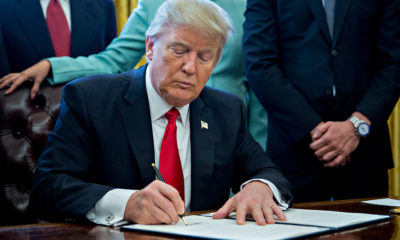Markets
Bonds Rise With Emerging Markets After Trump Selloff; Oil Surges
Published
8 years agoon

- Bonds Rise With Emerging Markets After Trump Selloff; Oil Surges
The fallout from Donald Trump’s election to the U.S. presidency eased off in financial markets with Treasuries and emerging markets halting their slide. Stocks jumped with crude.
Treasury 10-year note yields fell from this year’s high and Italy’s bonds outperformed German bunds, which investors tend to favor in times of turmoil. The Dow Jones Industrial Average climbed to a record and shares in developing nations rallied after a four-day slump. The dollar advanced to a five-month high against the yen, and Mexico’s peso led gains among major currencies. Oil surged the most in seven months as OPEC members were said to be making a final diplomatic push toward securing a deal to cut output.
Trump’s election victory, which came with pledges to cut taxes, spend more than $500 billion on infrastructure and restrict imports, triggered a record selloff in global bonds as traders assessed the implication for inflation and interest rates. Some, including Fidelity Investments’ Ford O’Neil, have already expressed skepticism that Trump’s proposals will be fully backed by Congress, while Goldman Sachs Group Inc. last week said the rally in iron and copper was “too much, too fast.”
“Many people were surprised by the market reaction to the election, but now portfolio managers are starting to focus more on where potential investment opportunities may be with a Trump administration,” said Ross Yarrow, director of U.S. Equities at Robert W. Baird & Co. in London. There has been “lots of chatter of fiscal stimulus and tax reform, but there are still a lot of moving parts and no firm details.”
Bonds
The yield on benchmark Treasury 10-year notes dropped three basis points, or 0.03 percentage point, to 2.23 percent as of 4 p.m. New York time. The 41 basis-point jump over the last three trading sessions marked the steepest climb in more than seven years and the 14-day relative strength index for the securities indicated they were the most oversold since 1990, a potential signal that they may be set for a reversal.
O’Neil, who oversees about $100 billion in bonds for Fidelity Investments, said the sharp run-up in yields following the election may not be justified given that Trump will face resistance from Congress in getting his fiscal stimulus plans approved.
Federal Reserve Bank of Richmond President Jeffrey Lacker said Monday that easier fiscal policy may require higher rates, but it’s too early for the central bank to react to potential policy changes by the incoming administration.
Italy’s 10-year yield slid 12 basis points to 1.96 percent, after rising for five consecutive days, and that on Spanish securities with a similar due date dropped to 1.45 percent, from as high as 1.66 percent on Monday. German bund yields were little changed at 0.31 percent, as a report showed growth in Europe’s biggest economy slowed to the weakest pace in a year last quarter.
Indian bonds rallied on expectations liquidity will improve in the wake of Prime Minister Narendra Modi’s surprise Nov. 8 crackdown on unaccounted wealth through the withdrawal of high denomination bills. Japan’s 10-year bond yield increased to zero, having been negative for almost eight weeks, as a gauge of demand weakened at a sale of five-year securities on Tuesday.
Currencies
A broad index of the greenback fluctuated after a four-day rally, its longest in a month, as U.S. retail sales figures were stronger than forecast, while Federal Reserve Bank of Boston President Eric Rosengren said the central bank would tighten monetary policy faster with more fiscal stimulus. The president-elect’s proposals to increase spending and cut taxes are fueling bets economic growth will accelerate and push the Fed to raise interest rates.
“The dollar is potentially going to go a lot higher still, if we do go down the route of extra fiscal stimulus,” which would also result in higher interest rates, Jeremy Hale, head of global macro strategy and asset allocation at Citigroup Inc., said in a Bloomberg Television interview. “That mixture of growth stimulus through the fiscal side and tighter monetary policy can be very powerful for the currency.”
The Bloomberg Dollar Spot Index, which tracks the U.S. currency against 10 major peers, lost 0.1 percent. It surged 2.8 percent last week, the most since 2011, and on Monday erased its losses for this year. The greenback rose 0.8 percent to 109.23 yen.
The pound fell for a second day versus the dollar as a report showed U.K. inflation unexpectedly slowed in October. Bank of England Governor Mark Carney told lawmakers that sterling weakness was due to the outlook for slower growth.
The MSCI Emerging Markets Currency Index rose 0.4 percent as Mexico’s peso and South Africa’s rand rallied more than 1.8 percent. China’s yuan slipped to its weakest level since 2008.
Commodities
Iron ore slid 9 percent in Singapore, extending the last session’s retreat from a two-year high. The price soared by a record 27 percent last week, driven by speculative interest in China and optimism Trump’s policies will boost steel demand. Goldman Sachs said Friday that iron ore’s reaction to the Trump win was excessive, while Capital Economics Ltd. warned prices will face growing pressure from rising supply.
Copper pulled back from near a one-year high, while gold rebounded from a five-month low. It slid 4.4 percent over the last three days as the dollar strengthened.
Crude oil rose 5.8 percent to $45.81 a barrel in New York. Qatar, Algeria and Venezuela are leading the effort to finalize a deal, a delegate familiar with the talks said.
Stocks
The S&P 500 Index rose 0.8 percent to 2,180.39, after edging lower Monday for a second straight decline. The Dow Average advanced for a seventh straight day, while the Nasdaq Composite Index rallied 1.1 percent.
As central bankers look for signs of stronger growth, a report today showed sales at retailers rose more than forecast last month in a broad advance after an even stronger September than initially estimated, marking the biggest back-to-back increase since 2014. A separate reading on November manufacturing in the New York region unexpectedly rose.
“The retail sales data showed broad-based gains rather than just narrowly focused on home improvement and autos. That’s heartening,” said Brian Jacobsen, the chief portfolio strategist at Wells Fargo Funds Management LLC, which oversees $242 billion. “This is another data release that if the Fed had in hand when it met at the beginning of November, it probably would have hiked. The economic data isn’t likely going to derail this Trump-bump in the market. It could be handed off to a Santa Claus Rally.”
The Stoxx Europe 600 Index rose 0.3 percent. It has swung between intraday gains and losses for six sessions, matching a streak last seen in August, and has struggled to break out of a trading range of about 20 points since July.
Is the CEO and Founder of Investors King Limited. He is a seasoned foreign exchange research analyst and a published author on Yahoo Finance, Business Insider, Nasdaq, Entrepreneur.com, Investorplace, and other prominent platforms. With over two decades of experience in global financial markets, Olukoya is well-recognized in the industry.

You may like
-


US Embassy Mandates Two Visits for Visa Applicants in 2025
-


Amid Insecurity, Nigerians Forsake Nation’s Military, Embrace US Armed Forces To Gain Citizenship
-


Firearms, Tax Convictions: Biden Recants, Pardons Son Weeks To Exiting Office
-


Social Security Benefits Set to Increase by 2.5% in 2025: How to Adjust Your Retirement Strategy
-


Iran’s Currency Plummets to Historic Low Amid Trump’s Return to the White House
-


Donald Trump Projected To Occupy White House, Congratulated By Nigerian President









